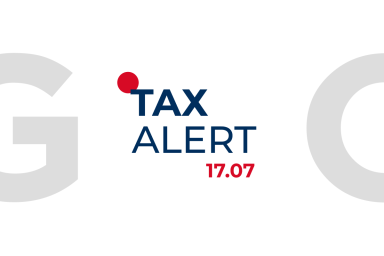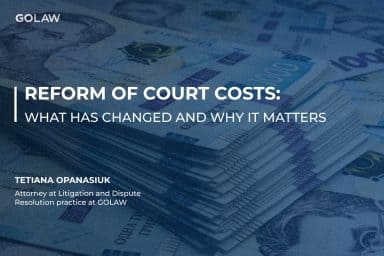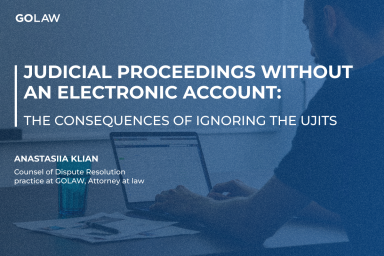Foreign companies doing business in Ukraine in 2021: tax issues to consider
Contents
In the middle of 2020, significant tax reform was introduced in Ukraine. The newly adopted changes aim at implementing the BEPS plan into Ukrainian legislation and can influence significantly the presence of foreign business here.
Let’s clarify, what are the main current risks and points to consider for foreign business in Ukraine after the reform.
Permanent establishment: the new understanding
On January 1, 2021, a major part of the new anti-avoidance rules came into force, including the updated definition of permanent establishment, which was supplemented and detailed to follow the recommendations of the OECD and to implement the BEPS Action 7.
The detailed definition states, inter alia, that the persons factually having and normally using powers to negotiate the substantial terms of the contracts for the interest of a non-resident and/or its associated enterprises or to store the goods belonging to a non-resident, qualify as a permanent establishment.
The list of criteria regarding factual powers of a person to act on behalf or in the interest of a non-resident was introduced into the Tax Code. The criteria cover:
- compulsory instructions provided by a non-resident;
- the existence and use of a corporate e-mail address of the non-resident and/or the associated enterprises;
- execution of property rights over the goods or other assets of a non-resident;
- the existence of real estate, leased by a person on its own behalf for storing the property of a non-resident or for other purposes, determined by a non-resident.
It is important to note, that the list is non-exhaustive, and the tax authorities can use other arguments to prove that certain activities are a permanent establishment.
How can the tax authorities detect a permanent establishment?
The draft procedure of audit of non-residents, carrying out business through separated branches, including permanent establishments, was published by Ministry of Finance at the end of 2020.
The procedure enables the use of wide range of information sources, in particular, information obtained from other taxpayers, state bodies, banks and other finance institutions, competent authorities of other countries, etc. Moreover, any publicly accessible information that can confirm the existence of a permanent establishment may be used.
It is worth noting, that the audits related to the existence of the permanent establishment can be conducted without a prior notice. Tax authorities have the right to initiate such audits starring from July 2021.
Interpreting the new definition
It is obvious, that not all of the activities in favor of a non-resident amount to the recognition of a permanent establishment. The preparatory or auxiliary exemption is still in force.
Thus, each situation must be analysed on case-by-case basis and even the wordings of contracts may be decisive. There is no practice of the use of new provisions by Ukrainian tax authorities or courts. That is why OECD commentaries to the Model Tax Convention can be a credible and helpful source for practical understanding and interpretation of the new definition, especially taking into account their growing influence on courts’ positions in the tax disputes.
Determination of taxable income of a permanent establishment
The provisions that entered into force provide that the profits earned by a permanent establishment shall be determined in line with the arm-length principle using the transfer pricing methods. It means that the earnings of a permanent establishment must be equal to the earnings of an independent enterprise, carrying out the same or similar activity in the same or similar circumstances. Such a rule, in fact, introduced the Authorized OECD Approach into Ukrainian legislation.
Registration procedures of non-residents
Another new development is the obligation of formal registration with tax authorities of non-residents that have a registered permanent establishment or representative office if Ukraine or those non-residents that de facto are doing business in Ukraine without any registrations.
The non-residents must register with the tax authorities instead of their permanent establishments until March 31, 2021. For non-compliance with this obligation, a penalty of UAH 100 000 is envisaged. The audits on that matter can be conducted from July 1, 2021. This requirement is quite disputable because there is no clear procedure for the non-residents’ registration with tax authorities. The respective procedure is still on the development and registration in the Ministry of Justice of Ukraine stage. Therefore, it is recommended to rely upon Tax Code of Ukraine that determine that list of documents that shall be filled and the currently valid Procedure on Accounting of Taxpayers approved by the Order of the Ministry of Finance of Ukraine # 1588 dated December 09, 2011.
Other grounds for the registration of a non-resident with the tax authorities is a purchase of a real estate or property rights for real estate in Ukraine, opening of bank accounts in Ukraine, purchase of an investment asset from another non-resident not having a permanent establishment in Ukraine.
Controlled foreign companies rules
According to the recently adopted Law No. 1117, the application of CFC rules was postponed until January 1, 2022. This means that the first reporting year is 2022, but the report can be lodged together with the tax return for 2023 (in 2024).
No financial penalties can be imposed for any breaches of rules concerning the calculation of the profits of the controlled foreign companies for the reporting periods 2022-2023, as well as no criminal or administrative liability can be invoked. Any information obtained in course of reporting for the periods of 2022-2023 is precluded from being transferred to the law enforcement bodies and cannot be used as evidence in any criminal procedure.
The postponement of controlled foreign companies’ related rules enables those, whom these rules may concern, to restructure their assets carefully and deliberately. Such restructuring can include change of the residence, improvement of substance of the controlled foreign companies, as well as liquidation.
Conclusion The tax reform influences the non-residents activities in Ukraine, and a lot must be considered in this regard. However, there is still time to mitigate the risks and adjust the business to the new tax reality.
Sign up to be aware
New achievements are inspired by information. GO further, don’t miss out GOLAW news and legal alerts
Our expertise
-
- Antitrust and Competition
- Banking and Finance
- Compliance, Corporate Governance and Risk Management
- Corporate and M&A
- Criminal and White Collar Defence
- Defense in Anti-corruption procedures and regulations
- Labor and Employment
- Natural Resources and Environment
- Government Relations (GR)
- Insolvency and Corporate Recovery
- Intellectual property
- International trade
- Legal support of business and private Сlients in Germany
- Litigation and dispute resolution
- Private clients
- Real Estate and Construction
- Energy and Natural Resources
- Restructuring, Claims and Recoveries
- Martial Law
- Tax and Customs
-
- Agribusiness
- Aviation
- Chemical industry
- Engineering, Construction and Building Materials
- Natural Resources and Environment
- Financial institutions
- IT and AI
- Industry and manufacturing
- Healthcare industries, Life sciences and Pharmaceuticals
- Media, Entertainment, Sports and Gambling
- Retail, FMCG and E-Commerce
- Transport and Logistics
We use cookies to improve performance of our website and your user experience.
Cookies policy
Cookies settings







